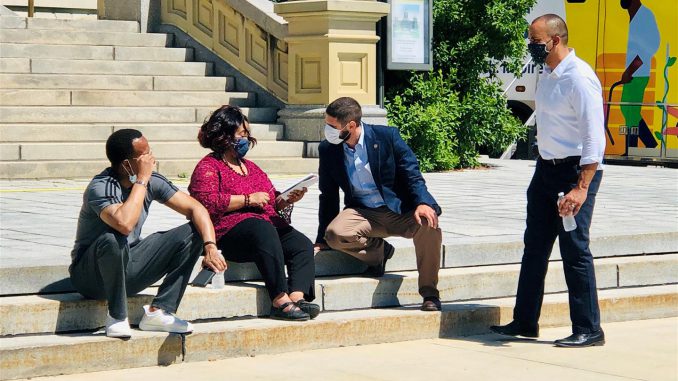
The last couple weeks have been heart-wrenching.
We cannot forget the utter horror of seeing a black man in a midwestern city having the life literally crushed out of him so casually by an officer who refused to acknowledge his pleas or those of the witnesses to his killing. Over the course of nine minutes–Nine, stone-cold minutes. Three of those minutes where George Floyd didn’t move. Not a flinch. And not a moment of concern, let alone an attempt at aid, by the officer. In those nine minutes, it is undeniable: George Floyd was a black life that did not matter. Just nine minutes of deadly indifference.
That indifference is also starkly symbolic. We cannot pretend that this is a new problem, a unique problem, or that it is going away. We also cannot pretend that the problems of a growing mental health crisis and escalations of gun violence have not made police work today exceptionally dangerous.
Our city, state, and nation are struggling with what is broken in our society. Racial injustice isn’t new, but our solutions absolutely must be. We have seen powerful, poignant moments. A peaceful, massive assembly has inspired new conversations. It also inspired a powerful and real emotion for some: anger.
We have seen people rise to the occasion, like Representative Ako Abdul-Samad, who has stood between the crowds and police. We’ve seen our police officers put in the awful position of being the subject of protest as they fulfill their sworn duty to protect our community. We need them. They, too, have felt the horrific sting of senseless murder.
Just three years ago, we saw two police officers here lose their lives after they were targeted and shot dead simply because they wore the shield of protection and service on their chests. We need good people in our police force to keep our communities and neighborhoods safe, and we need to find ways to heal these wounds and right these wrongs to get there.
This moment, awful as it is, can be an opportunity. Elected representatives of the people are duty bound to lift their voices and promote well-being. Those who are hurting should be able to turn to their government as a partner, not an adversary, in making their lives better.
We need to root out implicit bias in our judicial system and eradicate the racial injustices that have led us to disproportionate rates of incarceration and poverty in our state’s racial and ethnic minority communities. Disparities cannot continue in education and health care. In short, we have a lot of work ahead of us in this state.
I and Representative Ruth Ann Gaines are working now to plan community meetings in our neighborhoods to listen, collaborate on solutions, and offer new legislation to help make tomorrow a better day for Iowa. We must seek to understand each other, heal the wounds, and unite to create a better path forward for our city, state, and nation.
